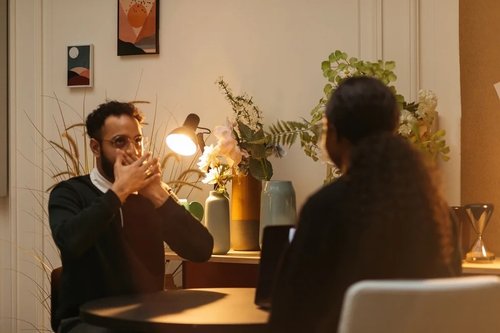How do you manage informal moments during a job interview?
Jul 13, 2021
4 mins


Journaliste indépendante.
A job interview isn’t just about the time you spend sitting opposite the recruiter, having a conversation–either at a desk or via a computer screen. In-person interviews begin when you’re at least 50 meters away from their office. And they end only when you leave that zone. Be wary. “Nothing is informal in an interview, you must never let your guard down,” confirms Jeanne, a headhunter for a consulting group.
All those “casual” moments that happen during an interview give the recruiter important clues about your personality. And though online interviews had their moment during lockdown–and as we continued to work from home–the trend is now towards in-person interviews again. So how do you get back into “good” habits? It starts with identifying those unstructured moments and handling them without making unconscious gaffes.
Those informal little moments where you might slip up
Those informal moments require a balance between being professional and being friendly. Nothing happens by chance. “A recruiter’s job is knowing how to create those moments to test you,” says Jeanne – which allows them to see beyond everything you’ve prepared. This is the time to score points (or at least not to lose them).
The first few minutes
It’s essential to make a good impression when you meet the recruiter for the first time. A Princeton University study showed that it only takes a tenth of a second for us to judge someone – and it’s very difficult to make a “second” impression. The study also found that “reliability” was the next most important criteria that we registered.
A coffee break
The recruiter might invite you to have coffee with them. It’s just another chance for them to get a feel for your personality! Avoid being too relaxed or contradicting yourself: “I was once recruiting for a position that required someone to do a lot of daily driving,” Jeanne recalls. “I met a very motivated candidate with an ideal profile. During the second interview, I invited her for coffee and we chatted for ten minutes or so before she told me she had had trouble getting to the interview on time because of an issue with the train. I figured out that she hadn’t got her driving license yet.”
The final stretch
So the interview is over and the recruiter wants to see you out? It’s still not safe to drop your guard. Too many candidates trip up in these last few moments – it’s where most blunders happen. “At the reception, a candidate asked me how many employees there were in the building. I told him there were about 6,000. He looked surprised and said, ‘Wow, you’re huge!’ I laughed, but he was embarrassed,” Jeanne recalls.
The lift test
The lift is the epicenter of awkwardness within a company, where 30 seconds in transit between floors can feel like an eternity – particularly if there are other people in there who aren’t talking. If the recruiter says nothing, you should be equally discreet to avoid blunders. How do you know if the people in the lift with you are even aware that the position you’re interviewing for is available?
Bonus: within 50 meters of the company
The interview is over, you’ve left the building and you’ve started to relax. But be careful: don’t give your best friend a blow-by-blow account over the phone and tell them at top volume how hideous the recruiter’s socks were. One of their colleagues might still be around. Be careful: walls have ears.
Top 5 errors to avoid
So, what should you avoid doing during all these informal interview moments – which are clearly part of the recruitment process – to stay in the running?
1. Talking about serious issues
“So what do you think about the US approach to Iranian nuclear policy?” Don’t try and display your extensive knowledge of geopolitics: these informal moments are all about small talk. Take advantage of them to touch on lighter subjects – ideally ones that are relevant to the company: the architecture of the building, the number of employees, the work environment, and so on. It will also demonstrate a healthy curiosity.
2. Being negative
Did you have a hard time finding the car park? Was your train late? Did your cat leave hair all over your suit? That’s all very interesting – but keep it to yourself. Even if you’ve had a difficult day, try and make the conversation upbeat. You’ll show that you’re a positive person who doesn’t take life lying down: you know how to adapt, be philosophical, and roll with the punches. You can overcome any obstacle that’s thrown at you – a skill your recruiter will appreciate.
3. Talking solely about yourself
Of course, this is your specialist subject. But unless the recruiter has specifically asked you a question about yourself, avoid making the discussion all about you. Instead, take advantage of these moments to show your interest in the company: curiosity is a good way to stand out.
4. Showing unpleasant non-verbal behavior
Remember: 93% of your communication is non-verbal – it’s in your body language and your attitude. So control that foot tapping impatiently under the table; beef up a limp handshake; don’t avoid their gaze. When you’re stressed, all these gestures add up to pollute your exchanges and send negative signals to the recruiter.
5. Wanting to seem too confident
You want to appear confident to stand out from all those other stressed-out candidates – but don’t overplay your hand. If the recruiter asks you about other job opportunities, don’t go on about them. For most positions, being overly polite and modest will be forgiven far more quickly than overconfidence.
What do these moments say about you?
While the questions you ask a recruiter may seem inoffensive, they say a lot about you. A clever person will read into their deeper meaning. Are you asking them about the size of your future office? Perhaps you need recognition or privacy. Do you want to know how much leave you’ll get? Your private life is important to you. You’re giving them clues about your personality, your needs, and your desires.
All these “informal” moments are a chance to show another side of your personality. Be curious and let the recruiter know you’re already thinking about the job. To seem relaxed – though not too laid-back – imagine you’re speaking to a former teacher, one of your parent’s friends, or anyone you feel respect and empathy for, while also being at ease with them. In short, show that you will not only be a consummate professional, but you’ll also be a pleasant person to have on the team.
Photo: Welcome to the Jungle
Follow Welcome to the Jungle on Facebook, LinkedIn, and Instagram, and subscribe to our newsletter to get our latest articles every day!

More inspiration: Job interview survival guide
Ace your job interview with our comprehensive guide. From preparing for different recruiters to managing informal moments, our tips and techniques will help you shine.

Beyond the basics: advanced strategies for researching a company before an interview
Want to show off your knowledge and impress the recruiter? Don't skip out on the in-depth researching stage of preparing for an interview!
Mar 29, 2023

Interview faux pas: 10 mistakes you didn't know you were making
Want to ace your next job interview? Here are 10 common mistakes to avoid, according to career expert Alan Stein.
Mar 21, 2023

People-pleasing in an interview: how a minion mentality can derail your career
"Yep, sure, no problem, I can do that!" People pleasers, beware. Overselling yourself to the recruiter could come back to bite you...
Dec 13, 2022

Interviewing with a friend: the pros, the cons, and how to handle it
Thanksgiving is the perfect time for catching up with loved ones, eating great food, and ... networking?
Nov 22, 2022

The secret art of selling yourself in an interview
Beyond convincing the recruiter your skills and experiences are relevant, you need to be able to sell YOU. A personal branding expert shares his tips.
Nov 10, 2022
The newsletter that does the job
Want to keep up with the latest articles? Twice a week you can receive stories, jobs, and tips in your inbox.

Looking for your next job?
Over 200,000 people have found a job with Welcome to the Jungle.
Explore jobs